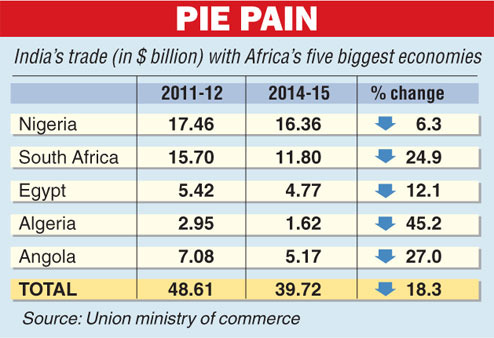News
Africa trade ache cloud on meet

Prime Minister Narendra Modi hopes to pull Africa into a tighter hug with India when he hosts the continent’s leaders next month. But some of his guests may for now settle for a return to the economic sheen their ties enjoyed three years ago.
A sharp drop in trade with India over the past three years has triggered worries in Africa’s biggest economies at a time New Delhi is plotting its biggest ever outreach to the continent through a grand summit in October, African and Indian officials have cautioned.
From October 26 to 29, India will serenade leaders from each of Africa’s 54 nations in the triennial summit former Prime Minister Manmohan Singh started in 2008 as it tries to match China’s influence in one of the world’s fastest growing economic regions. Never before has India invited all 54 African nations to the summit.
But since the last summit, in Addis Ababa in 2011, India’s bilateral trade with each of Nigeria, South Africa, Egypt, Algeria and Angola – Africa’s five largest economies – has declined, in some cases steeply (see chart).

For India, some of this decline carries a positive tinge, at least in the short run. India’s import bill from these countries has fallen sharply because of the drop in global prices of oil and commodities like gold, aluminium and other minerals that form the mainstay of New Delhi’s purchases from Africa.
But with Nigeria, Africa’s biggest economy, India’s exports too have dropped marginally since 2011-12, according to ministry of commerce statistics for 2014-15. The sharp decline in economic gains for the biggest – and most influential – African nations means their leaders may head to New Delhi with a focus starkly different from Modi’s. That focus will include concerns that Modi’s economic regime needs to improve too.
“Reviving the bilateral trade between India and South Africa to 2011-12 levels is a key challenge, and one we are focused on,” Stefanus Botes, minister counsellor (economic) at South Africa’s high commission here told The Telegraph. “Gold is of course a key component of our trade, but we need to, and are trying to, diversify.”
India is the world’s biggest purchaser of South Africa’s gold, but a series of import control duties imposed by then finance minister P. Chidambaram hit purchases of the metal in 2013. Some of those duties have been eased by the Modi government but South African officials argue that much more can be done.
From constituting over half of all South African exports to India, gold today makes up just over 30 per cent of what New Delhi purchases from that country. Coal, for long India’s second-biggest purchase from South Africa, has surpassed gold but South Africa’s total exports to India have dropped 40 per cent since the last India-Africa summit.
Nigeria and Angola are today among India’s top 10 sources of crude – and their export gains to India have dropped with falling world oil prices. In the short run, Indian companies investing in oil and gas projects in Africa have gained while entering the sector because of the price crash, said Ruchita Beri, senior research associate at the Institute for Defence Studies and Analyses, a Delhi-based think-tank.
“They (African nations) are trying very hard to woo us. They know ours is a rare major economy that is growing,” Beri said. “Low commodity prices are hurting them, though these prices are often cyclical.”




